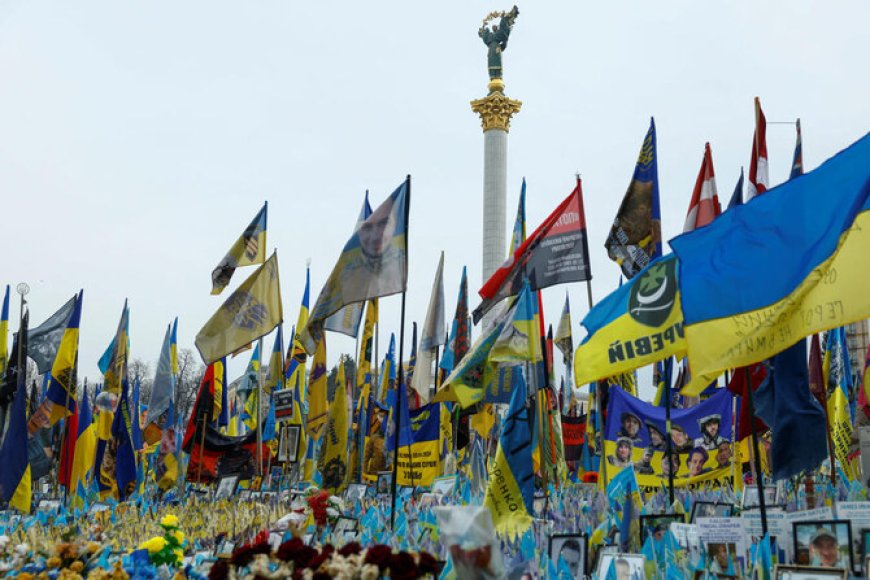A Complex, Risky Gamble: Europe's Quiet Push for Troops in Ukraine
European nations are quietly considering the challenging yet essential task of post-war security as the conflict in Ukraine continues to devastate the country. Europe has initiated an investigation into the means by which it can ensure Ukraine's security following the conclusion of the conflict, as peace negotiations are imminent. Nevertheless, the present methodology is ambiguous, and the consequences are substantial.

European nations are quietly considering the challenging yet essential task of post-war security as the conflict in Ukraine continues to devastate the country. Europe has initiated an investigation into the means by which it can ensure Ukraine's security following the conclusion of the conflict, as peace negotiations are imminent. Nevertheless, the present methodology is ambiguous, and the consequences are substantial.
At the forefront of these discussions are Britain and France, both of which are anxious to assist Ukraine in ensuring its future stability. However, the specifics of this plan remain unknown, as numerous countries involved in the negotiations are hesitant to disclose too much information for fear of inadvertently revealing information to Russia, which may attempt to disrupt peace talks at the first indication of foreign intervention.
Nevertheless, the European nations' sense of urgency is tangible. Europe is seeking to fill the void left by the United States' apparent decline in its involvement in the region, as they are alarmed by the perceived shift in U.S. security priorities under President Donald Trump's leadership.
A critical requirement for Ukrainian President Volodymyr Zelensky is the provision of security guarantees in the aftermath of the war. Ukraine has long sought membership in NATO; however, the United States has rejected this option, leaving the door open to alternative forms of international security.
Prime Minister Keir Starmer of the United Kingdom has cautiously observed that "if there is peace, there needs to be some sort of security guarantee for Ukraine," and Britain is willing to contribute to that guarantee. However, in order to ensure Ukraine's future, that assurance must be more than mere rhetoric. Zelensky's government is unequivocal: it requires forces, not merely assurances.
The genesis of this strategy was initiated approximately one year ago; however, it has recently gained momentum amid concerns that President Trump may attempt to negotiate a deal with Russian President Vladimir Putin that would expose Ukraine to potential threats. Before Trump assumed office in December 2024, a delegation of European leaders, including those from the United Kingdom, France, Germany, and Poland, convened in Brussels to establish the foundation for future security arrangements.
French President Emmanuel Macron was an early proponent of a European military presence, a position that was initially met with substantial opposition from countries such as Germany and Poland. However, Macron's previously isolated stance has garnered increasing support as the conflict continues and the necessity for post-war planning becomes more pressing.
Many concerns remain unresolved, despite the growing consensus on the necessity of European troops. The scale and scope of any European deployment will be significantly influenced by the nature of the peace settlement between Russia and Ukraine. A robust force will be necessary if the peace agreement is fragile or contentious, as many anticipate—a far cry from the symbolic peacekeeping operations frequently observed with the United Nations.
Ben Hodges, the former Commanding General of U.S. Army Europe, cautions, "They will be crushed if they enter with a large number of rifles and blue helmets." In order to effectively deter Russian aggression, European forces will need a highly capable and formidable military presence, which includes airpower, large land forces, drones, and missile defense systems, according to leading experts.
Nevertheless, the notion of a substantial European force generates substantial logistical concerns. Macron has himself dismissed the idea of establishing a substantial military presence, describing it as "fanciful" and emphasizing the necessity of practical and well-reasoned solutions. Nevertheless, Ukraine has asserted that it will not accept a token force; Zelensky is adamant about a substantial contingent, with some sources indicating that Ukraine is seeking between 100,000 and 150,000 soldiers.
It is uncertain whether European nations can mobilize such a force, particularly given the domestic political obstacles that many of them would encounter. For example, Italy is constitutionally prohibited from deploying its military overseas, and Germany's posture may change subsequent to its elections in late February. In the interim, Poland, which has historically been hesitant to commit significant numbers of troops to Ukraine, is being more circumspect.
The issue of the United States' participation further complicates the situation. According to U.S. Defense Secretary Pete Hegseth, any operation conducted by a European nation must be supported by both European and non-European soldiers who are capable. Nevertheless, he has also stated that the United States will not deploy troops to Ukraine, necessitating that Europe assume responsibility for any security guarantees.
However, Ukraine would find such an operation to be ineffective in the absence of U.S. support. Ukrainian Foreign Minister Dmytro Kuleba emphasized the profound dependence on U.S. military capabilities, particularly in the areas of logistics and air support, stating that "any security guarantees are impossible without the Americans."
Nevertheless, it is evident that Europe's present course of action is characterized by uncertainty. The risk of failure is substantial, and the actuality of post-war security in Ukraine remains a complex and volatile issue. Europe will be required to navigate its internal divisions, coordinate a response that encompasses both military and diplomatic strategies, and contend with the persistent threat of Russian aggression as the situation evolves. However, one thing is certain: the journey to restoring peace in Ukraine will be difficult, and the repercussions of any errors will extend far beyond the nation's borders.













































